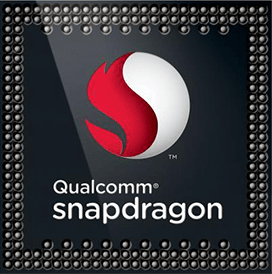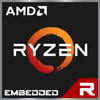
Qualcomm Snapdragon 820 Benchmark, Test and specs
Last updated:
The Qualcomm Snapdragon 820 has 4 CPU cores and can process 4 threads at the same time. The processor was presented in Q4/2015 and is based on the 3. Generation of the Qualcomm Snapdragon series. In the Geekbench 5 benchmark, the Qualcomm Snapdragon 820 achieved a result of 344 points (single-core) or 903 points (multi-core).

| Name: | Qualcomm Snapdragon 820 |
|---|---|
| Family: | Qualcomm Snapdragon (102) |
| CPU group: | Qualcomm Snapdragon 820 (3) |
| Architecture: | Kryo |
| Segment: | Mobile |
| Generation: | 3 |
| Predecessor: | -- |
| Successor: | -- |
CPU Cores and Base Frequency
The Qualcomm Snapdragon 820 has 4 cores. The clock frequency of the Qualcomm Snapdragon 820 is 2.15 GHz. An initial performance assessment can be made using the number of CPU cores.
| CPU Cores / Threads: | 4 / 4 |
|---|---|
| Core architecture: | hybrid (big.LITTLE) |
| A-Core: | 2x Kryo |
| B-Core: | 2x Kryo |
| Hyperthreading / SMT: | No |
|---|---|
| Overclocking: | No |
| A-Core Frequency: | 2.15 GHz |
| B-Core Frequency: | 1.60 GHz |
Artificial Intelligence and Machine Learning
Processors with the support of artificial intelligence (AI) and machine learning (ML) can process many calculations, especially audio, image and video processing, much faster than classic processors. Algorithms for ML improve their performance the more data they have collected via software. ML tasks can be processed up to 10,000 times faster than with a classic processor.
| AI hardware: | Qualcomm AI engine |
|---|---|
| AI specifications: | Hexagon 680 |
Internal Graphics
The Qualcomm Snapdragon 820 has an integrated graphics that the system can use to efficiently play back videos. The Qualcomm Snapdragon 820 has the Qualcomm Adreno 530 installed, which has -- streaming multiprocessors (256 shaders).
| GPU name: | Qualcomm Adreno 530 |
|---|---|
| GPU frequency: | 0.62 GHz |
| GPU (Turbo): | 0.62 GHz |
| Compute units: | -- |
| Shader: | 256 |
| Hardware Raytracing: | No |
| Release date: | Q4/2015 |
| Max. displays: | 0 |
|---|---|
| Generation: | 5 |
| Direct X: | 11,1 |
| Technology: | 14 nm |
| Max. GPU Memory: | -- |
| Frame Generation: | No |
Hardware codec support
Processors with integrated graphics can process video codecs faster. Support for modern codecs can significantly increase system efficiency during video playback.
| h265 / HEVC (8 bit): | Decode |
|---|---|
| h265 / HEVC (10 bit): | No |
| h264: | Decode |
| VP8: | Decode |
| VP9: | Decode |
| AV1: | No |
|---|---|
| AVC: | No |
| VC-1: | Decode |
| JPEG: | Decode |
Memory & PCIeThe Qualcomm Snapdragon 820 supports a maximum of 12 GB memory. Depending on the mainboard, the processor can use a maximum of 4 (Quad Channel) memory channels. This results in a maximum bandwidth of the main memory of 14.9 GB/s. |
|
| Memory type: | Memory bandwidth: |
|---|---|
| LPDDR4-3733 | 14.9 GB/s |
| Max. Memory: | 12 GB |
| Memory channels: | 4 (Quad Channel) |
| ECC: | No |
| PCIe: | |
| PCIe Bandwidth: | -- |
Thermal ManagementThe Qualcomm Snapdragon 820 has a TDP of . Based on the TDP, the system manufacturer can and must adapt the cooling solution to the processor. |
|
|---|---|
| TDP (PL1 / PBP): | |
| TDP (PL2): | -- |
| TDP up: | -- |
| TDP down: | -- |
| Tjunction max.: | -- |
Technical details
Modern production reduces the waste heat of a processor and increases its efficiency. The Qualcomm Snapdragon 820 is made in 14 nm and has 0.00 MB cache.
| Technology: | 14 nm |
|---|---|
| Chip design: | Chiplet |
| Socket: | -- |
| L2-Cache: | -- |
| L3-Cache: | -- |
| AES-NI: | No |
| Operating systems: | Android |
| Virtualization: | None |
|---|---|
| Instruction set (ISA): | Armv8-A (64 bit) |
| ISA extensions: | -- |
| Release date: | Q4/2015 |
| Release price: | -- |
| Part Number: | MSM8996 |
| Documents: | Technical data sheet |
Rate this processor
Benchmark results

The benchmark results for the Qualcomm Snapdragon 820 have been carefully checked by us. We only publish benchmark results that have been created by us or that have been submitted by a visitor and then checked by a team member. All results are based on and fullfill our benchmark guidelines.
Geekbench 5, 64bit (Single-Core)
Geekbench 5 is a cross plattform benchmark that heavily uses the systems memory. A fast memory will push the result a lot. The single-core test only uses one CPU core, the amount of cores or hyperthreading ability doesn't count.

|
Intel Core i3-4020Y
2C 4T @ 1.50 GHz |
||

|
Intel Celeron E3300
2C 2T @ 2.50 GHz |
||

|
Samsung Exynos 9611
8C 8T @ 2.30 GHz |
||
|
|
Qualcomm Snapdragon 820
4C 4T @ 2.15 GHz |
||

|
UNISOC T610
8C 8T @ 1.80 GHz |
||

|
Intel Core 2 Quad Q6600
4C 4T @ 2.40 GHz |
||

|
AMD Athlon II X4 620e
4C 4T @ 2.60 GHz |
||
Geekbench 5, 64bit (Multi-Core)
Geekbench 5 is a cross plattform benchmark that heavily uses the systems memory. A fast memory will push the result a lot. The multi-core test involves all CPU cores and taks a big advantage of hyperthreading.

|
AMD Athlon II X3 425e
3C 3T @ 2.70 GHz |
||

|
Intel Celeron G1820TE
2C 4T @ 2.20 GHz |
||

|
Intel Core 2 Quad Q8200
4C 4T @ 2.33 GHz |
||
|
|
Qualcomm Snapdragon 820
4C 4T @ 2.15 GHz |
||

|
Intel Core i5-2467M
2C 4T @ 2.00 GHz |
||

|
Intel Celeron N4020
2C 2T @ 2.70 GHz |
||
|
|
HiSilicon Kirin 659
8C 8T @ 2.36 GHz |
||
Geekbench 6 (Single-Core)
Geekbench 6 is a benchmark for modern computers, notebooks and smartphones. What is new is an optimized utilization of newer CPU architectures, e.g. based on the big.LITTLE concept and combining CPU cores of different sizes. The single-core benchmark only evaluates the performance of the fastest CPU core, the number of CPU cores in a processor is irrelevant here.

|
Intel Core i3-2328M
2C 4T @ 2.20 GHz |
||

|
Intel Core i3-2330E
2C 4T @ 2.20 GHz |
||

|
Intel Core i3-2330M
2C 4T @ 2.20 GHz |
||
|
|
Qualcomm Snapdragon 820
4C 4T @ 2.15 GHz |
||

|
Samsung Exynos 9611
8C 8T @ 2.30 GHz |
||

|
UNISOC T606
8C 8T @ 1.60 GHz |
||

|
Intel Celeron N4000C
2C 2T @ 2.60 GHz |
||
Geekbench 6 (Multi-Core)
Geekbench 6 is a benchmark for modern computers, notebooks and smartphones. What is new is an optimized utilization of newer CPU architectures, e.g. based on the big.LITTLE concept and combining CPU cores of different sizes. The multi-core benchmark evaluates the performance of all of the processor's CPU cores. Virtual thread improvements such as AMD SMT or Intel's Hyper-Threading have a positive impact on the benchmark result.

|
Intel Celeron G1620
2C 2T @ 2.70 GHz |
||

|
Intel Pentium 2030M
2C 2T @ 2.50 GHz |
||

|
Qualcomm Snapdragon 821
4C 4T @ 2.40 GHz |
||
|
|
Qualcomm Snapdragon 820
4C 4T @ 2.15 GHz |
||

|
Qualcomm Snapdragon 439
8C 8T @ 1.95 GHz |
||

|
Intel Core i3-2312M
2C 4T @ 2.10 GHz |
||

|
Intel Core i3-2310M
2C 4T @ 2.10 GHz |
||
iGPU - FP32 Performance (Single-precision GFLOPS)
The theoretical computing performance of the internal graphics unit of the processor with simple accuracy (32 bit) in GFLOPS. GFLOPS indicates how many billion floating point operations the iGPU can perform per second.

|
AMD A8-3800
AMD Radeon HD 6550D @ 0.60 GHz |
||

|
AMD A8-3820
AMD Radeon HD 6550D @ 0.60 GHz |
||

|
AMD A8-3850
AMD Radeon HD 6550D @ 0.60 GHz |
||
|
|
Qualcomm Snapdragon 820
Qualcomm Adreno 530 @ 0.62 GHz |
||

|
Qualcomm Snapdragon 821
Qualcomm Adreno 530 @ 0.62 GHz |
||

|
Intel Core i9-10880H
Intel UHD Graphics 630 @ 1.20 GHz |
||

|
AMD Ryzen Embedded R2312
AMD Radeon RX Vega 3 (Raven Ridge) @ 1.20 GHz |
||
Estimated results for PassMark CPU Mark
Some of the CPUs listed below have been benchmarked by CPU-monkey. However the majority of CPUs have not been tested and the results have been estimated by a CPU-monkey’s secret proprietary formula. As such they do not accurately reflect the actual Passmark CPU mark values and are not endorsed by PassMark Software Pty Ltd.

|
Intel Celeron G1610T
2C 2T @ 2.30 GHz |
||

|
Intel Core i3-2370M
2C 4T @ 2.40 GHz |
||

|
Intel Core i3-4010Y
2C 4T @ 1.30 GHz |
||
|
|
Qualcomm Snapdragon 820
4C 4T @ 2.15 GHz |
||

|
Intel Pentium 3550M
2C 2T @ 2.30 GHz |
||

|
AMD Athlon II X2 280
2C 2T @ 3.60 GHz |
||

|
AMD A4-5300
2C 2T @ 3.60 GHz |
||
Benchmarks

Geekbench 5 (SC)
2,488 entries
2,488 entries

Geekbench 5 (MC)
2,461 entries
2,461 entries

Geekbench 6 (SC)
1,755 entries
1,755 entries

Geekbench 6 (MC)
1,703 entries
1,703 entries

FP32 SP (iGPU)
2,042 entries
2,042 entries

PassMark CPU-Mark
2,392 entries
2,392 entries
Popular comparisons
back to index





